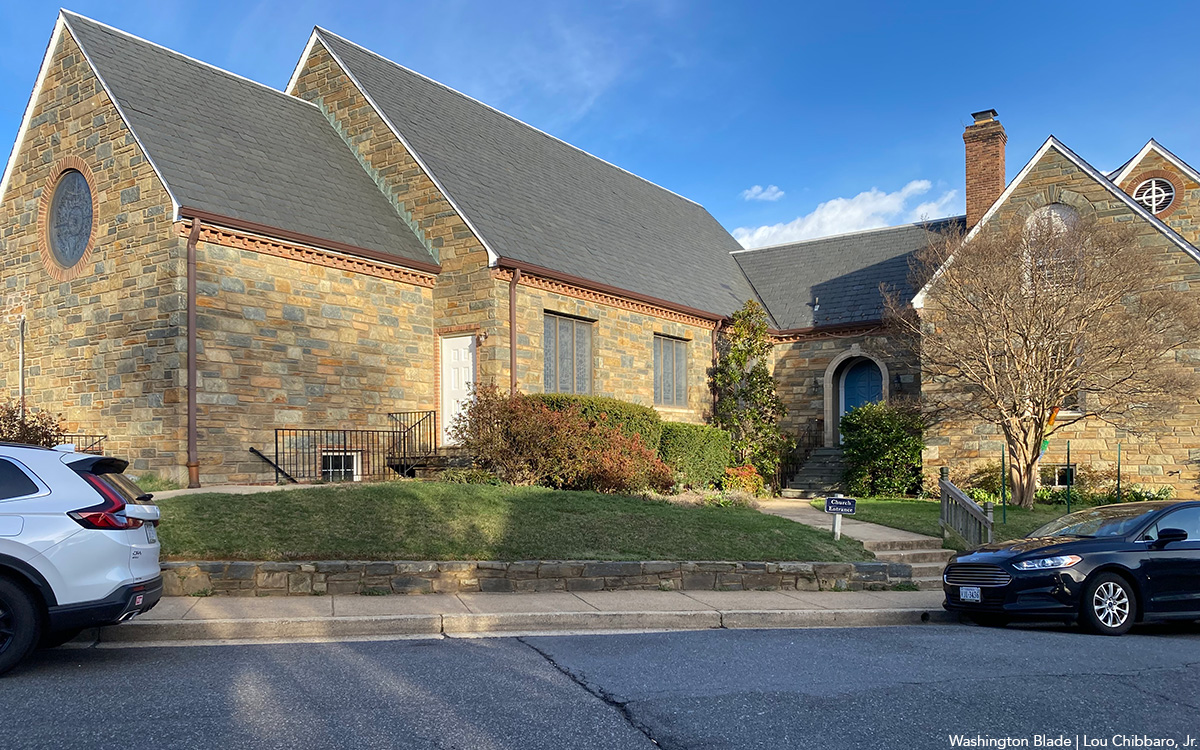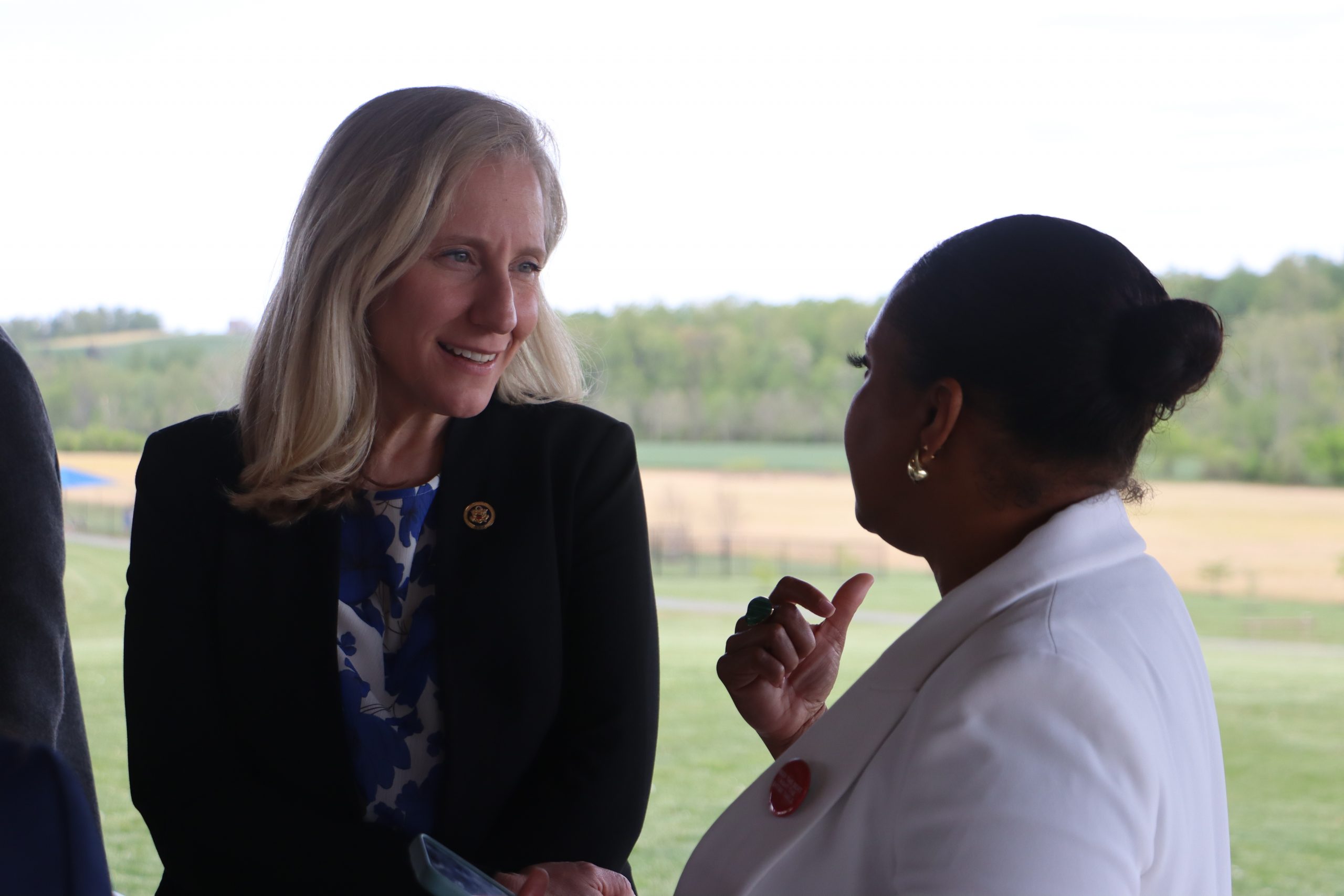Virginia
Arlington church seeks to offer LGBTQ-affirming senior housing
Project by Clarendon Presbyterian faces opposition from residents

Leaders and members of the Clarendon Presbyterian Church, which will celebrate its 100th anniversary on April 13, have said they decided to continue to fulfill their mission of religious faith by using the land on which their church is located in the Clarendon section of Arlington, Va., to develop a new, larger church building to include LGBTQ affordable housing for seniors along with an independently run childcare center that currently operates in the church.
“In line with the church’s deep history of supporting affordable housing, LGBTQ communities, and seniors, in 2021, the church relaunched a visioning process of how we might invest our most valuable physical resources, our church property, for the good of the community,” church leaders said in a Feb. 9, 2024, statement describing the project.
The statement says that in 2022, the congregation voted to partner with the Arlington Partnership for Affordable Housing (APAH), a real estate development company that specializes in affordable housing projects. Through that partnership, the statement says, the two partners in June of 2023 applied to the Arlington County government for a zoning change that would allow the construction of a building that could accommodate as many as 92 residential apartments for seniors 55 or 62 and older.
Among other things, the project calls for demolishing the current church building and constructing a new, larger building that would include a smaller version of the church space for its religious services as well as space for 40 to 58 children ages two through six at the Clarendon Child Care Center, which has operated at the church for more than 60 years.
Rev. Alice Tewell, the current pastor at Clarendon Presbyterian Church, told the Washington Blade another important factor contributing to the decision to redevelop the church property is the high cost of maintaining a 100-year-old building and its aging infrastructure that was becoming less and less affordable for the church’s budget. And like many churches across the country, the membership of Clarendon Presbyterian Church has declined over the years, making it no longer necessary for a worship service space as large as that in the current church building, Tewell said.
The statement describing the development plan says that without a major redevelopment project, the church could no longer afford to remain in the current building, forcing it to move to another location outside of Clarendon and possibly outside of Arlington.
According to Rev. Tewell, the redevelopment decision came after several years of internal discussion, meetings with longtime church allies, including members of the LGBTQ community and other community groups.
“And after all these conversations, we came to where we could serve Christ, which is part of our faith, and where we could be good neighbors in Arlington – would be to tear down our entire property and rebuild so it would include senior affordable housing as LGBT welcoming, a new church space, which we also plan to turn into a community space, and the new space for our preschool center,” Tewell told the Blade.
She noted that the church’s location at 1305 N. Jackson St. is walking distance to the Clarendon Metro station and many local amenities such as restaurants and retail stores, making it a convenient location for the senior residents in the redeveloped space.
She also points out that church members have consulted with the New York-based LGBTQ seniors advocacy organization SAGE, which informed them of the great need for LGBTQ welcoming senior housing, including in Northern Virginia.
But news of the church’s redevelopment project, especially reports that it would include a proposed 92-unit apartment building, prompted many nearby residents to raise strong objections and to call on the Arlington County Board, which must make a final decision on a zoning change, to deny the zoning change request.
Most of the opposition comes from residents of single-family houses, who point out that the church is located in a largely low-density residential neighborhood with just a few nearby low-rise apartment buildings. In August of 2023, a group of nearby residents created an online petition that gathered at that time more than 1,000 signatures calling for the county to turn down the church development project.
“We, the concerned residents of Arlington, Virginia, stand united in opposition to the proposed destruction of the historic, over 100-year-old, Clarendon Presbyterian Church (CPC) and the subsequent construction of a massive 6-story apartment building having 100 units within our cherished residential neighborhood,” the petition states. “We believe that this development project will have serious detrimental effects on our community’s character, quality of life, and historic heritage,” it says.
The Arlington Partnership for Affordable Housing, or APAH, the development company working in partnership with the church, submitted an official application on June 29, 2023, for a Special General Land Use Plan Study calling for the needed zoning change for the church project with Arlington County Zoning Administrator Arlova Vonhm. APAH officials have said the initial application was the first of a multi-step process seeking final approval of the project.
Garrett Jackson, APAH’s Director of Resource Development and Communications, told the Blade that APAH on behalf of the church asked the Zoning Administrator to put the application on hold while the church and APAH consider revisions for the project.
“We are currently working with our architect, engineer, and construction management team to assess the feasibility of different development options while also considering feedback we have received from the county and the community,” Jackson told the Blade in a March 15 email.
In a phone interview with the Blade on March 21, Jackson and APAH officials Mitchell Crispell and Brian Goggin, said the decision to put the project on hold did not come as a result of an informal message from the Zoning Administrator that the project was about to be turned down.
“So, we were the ones that put it on hold,” said Crispell, APAH’s Director of Real Estate Development. “It wasn’t the county that said no to us at all. We wanted to kind of pause for a minute and consider our options, the feasibility of different options and the development plans,” he said.
Crispell noted that the decision to put the project on hold came last fall, a few months after the application was submitted in June and after strong opposition to the project surfaced by nearby residents. Crispell, Jackson, and Goggin pointed out, however, that opposition to development projects is a common phenomenon in Arlington and other jurisdictions and that ongoing dialogue between developers and concerned residents often leads to a resolution to the objections.
“We understand the back and forth that it takes to get these projects to fruition,” Jackson said. “So, you’ve got to rest assured that this is very much a part of the very thorough process that both APAH and the county go through regularly to make sure that we’re getting the absolute best product in the actual building that will go up for Clarendon Presbyterian Church and for the future residents,” Jackson points out.
Jackson and his two APAH colleagues said they couldn’t immediately predict when they will resubmit the application for the zoning change. Spokespersons for the Zoning Office, the Arlington County Board, and Arlington County Manager Mark Schwartz didn’t immediately respond to a request by the Blade for comment on the church project and the likelihood of the county approving the project.
Among those supporting the church project is James Fisher, a longtime Arlington LGBTQ rights advocate and longtime church member. Fisher and Arlington gay civic activists Jay Fisette, a former elected member of the Arlington Board, and longtime Arlington resident Bob Witeck, who support the project, told the Blade they believe many nearby residents also support the church development project.
Fisette and Witeck said they do not believe anti-LGBTQ bias is a significant factor, if a factor at all, in the opposition to the church project.
“I personally observe this as disquiet about building a larger and taller presence in a space that abuts residential neighbors unsure of the implications or stresses that might come,” Witeck said. “I’m no Pollyanna, but really believe that with time, this change will be smoother than people fear or imagine,” he said.
Fisette said the church project comes a short time after the Arlington County Board adopted an “Expanded Housing Options” policy that allows for larger residential buildings in some areas originally zoned for low-density, single-family homes. This change drew objections among many residents in areas similar to where Clarendon Presbyterian church is located.
“I would say the LGBTQ elements of the proposal are likely more of a plus than a minus,” Fisette told the Blade. “I expect 99 percent of any resistance-anxiety relates to density and the real-feared impacts of that density,” he said.
Tewell told the Blade the church’s support for the LGBTQ community dates back to the 1980s, when church members voted in support of a then-controversial proposal to allow the D.C.-based Whitman-Walker Clinic, which had a Northern Virginia outreach, to use space in the church for a support group for people with HIV/AIDS and for HIV caregivers.
“And that started changing the church to becoming a church that was very welcoming to LGBTQ people,” she said, adding that the church subsequently opened its door for LGBTQ community events, some of which were organized by gay church member James Fisher. Among those using the church now is IMPACTO LGBT, a Spanish-speaking LGBT church that holds its worship services at Clarendon Presbyterian Church.
“This is how we are living out our faith in the world,” Tewell said. “We worked out what does God’s embodied love look like for the world? And how do we embody God’s grace, justice, and love? And we really feel that it is through housing for seniors that is welcoming to LGBTQ+ people,” she added. “And to transform our church space so it’s better equipped to welcome the community.”
Virginia
EXCLUSIVE: HRC PAC to endorse Spanberger for Va. governor
Former congresswoman to face off against state’s GOP lieutenant governor

The Human Rights Campaign PAC on Tuesday will endorse Democratic nominee Abigail Spanberger’s run for governor of Virginia, the organization told the Washington Blade.
The former CIA agent-turned-congresswoman, who represented her state’s 7th Congressional District from 2019 to 2025, will face off against Republican Lieutenant Gov. Winsome Earle-Sears in this year’s gubernatorial race.
A Roanoke College survey in February found Spanberger in the lead with a comfortable margin, 39-24, while a trio of polls in January found her ahead by one, five, and 10 percentage points.
Virginia’s incumbent Republican Gov. Glenn Youngkin, who is prohibited from seeking a second term under the state’s constitution, has consistently restricted LGBTQ rights and attacked the transgender community since taking office in 2022.
HRC said Spanberger’s candidacy “offers Virginians renewed hope for a future rooted in equality,” with the group’s president, Kelley Robinson, calling her “a champion for the LGBTQ community.”
Noting the former congresswoman’s co-sponsorship of the Equality Act, legislation that would expand federal anti-discrimination protections to include LGBTQ people, Robinson said Spanberger “understands that Virginia’s future success depends on the full inclusion and protection of all its people.”
HRC’s president added, “As governor, she will work tirelessly to build a Virginia where everyone — regardless of who they are or who they love — can live, work, and go to school with dignity, safety, and opportunity. We are thrilled to support her and mobilize pro-equality Virginians to make her the commonwealth’s next governor.”
Responding to news of the endorsement, Spanberger said “I’m honored to earn the endorsement of the Human Rights Campaign, and I’m ready to work together to build on the progress we’ve made to secure equal protections for all Virginians under the law.”
“Affirming that Virginia is a welcoming home for all families goes beyond protecting marriage equality — it means defending Virginians’ right to live without fear of discrimination or harm,” she said. “As governor, I will work to make sure that no Virginian is denied government services, loses a job, or faces any other form of discrimination because of who they love or who they are.”
HRC further noted that Spanberger fought to pass the Respect for Marriage Act, which was signed into law in 2022 and codified legal protections for married same-sex and interracial couples, as well as her promise to “defend marriage equality and work with the General Assembly to enshrine marriage equality in Virginia’s constitution.”
Spanberger has also committed to “signing legislation guaranteeing Virginians’ right to access contraception and birth control,” HRC wrote, “and protecting against attempts by extreme judges and politicians to roll back Virginians’ reproductive freedoms.”
By contrast, the organization criticized Sears’s LGBTQ rights record — noting that in 2004, she pledged to “emphatically support a constitutional amendment” banning same-sex marriage, in 2021, she campaigned with a gubernatorial candidate who said homosexuality was the “work of the devil,” and in 2022, she “dodged questions” about her position on marriage equality and “attempted to rewrite her hateful history.”
Since 1977, with only one exception, Virginia has elected governors who belong to the party that is out of power at the presidential level. The state’s upcoming off-year gubernatorial contest presents an opportunity for Democrats who are eager for a major electoral victory to channel momentum against President Donald Trump and Republican majorities in Congress.
Virginia
Fairfax County School Board issues Trans Day of Visibility proclamation
Activists hold rally supporting measure

A group of more than 100 supporters gathered outside of Luther Jackson Middle School in Falls Church, Va., on Thursday, March 27 to show appreciation for the passage of a Transgender Day of Visibility proclamation by the Fairfax County School Board. The board unanimously passed the proclamation in its general meeting held in the auditorium of the middle school that evening.
Karl Frisch, Fairfax County School Board chair, introduced the proclamation recognizing March 31 as Transgender Day of Visibility in Fairfax County Public Schools.
The Fairfax County School Board passed the proclamation, which “encourages all to promote a caring culture of equity, inclusivity and respect for transgender people, not only on this special day but throughout the entire year as well.”
Vanessa Hall, co-chair of FCPS Pride, was among the speakers and organizers of the Transgender Day of Visibility rally preceding the school board meeting.
“In this world right now, this world which feels so chaotic and threatening — which really seems to be overly focused on trans children, removing their rights — we need to take this opportunity to gather our community, to celebrate joy, to see each other and to gather our strength for the next attack, frankly,” Hall told the Blade.

Rev. Emma Chattin of the Metropolitan Community Church of Northern Virginia was among the speakers at the rally.
“We have to be visible — all of us — friends, family, allies, speak up!” Chattin called out to the crowd. “To do otherwise does a disservice to the strong souls that came before us. For the struggles that they faced are now ours. The spirits of Marsha P. Johnson and Sylvia Rivera look to us now. Because liberation is a long, long struggle. We are not helpless and we cannot be hopeless. Our time is now. We are a powerful people. We leave a mark and we will not be erased.”

Virginia
Virginia governor vetoes bill barring discrimination against PrEP users
Youngkin’s move disproportionately impacts LGBTQ community

Virginia Gov. Glenn Youngkin this week vetoed a bill that would have made it illegal for health and life insurance companies to discriminate against individuals who have taken pre-exposure prophylaxis (PrEP) for HIV prevention.
House Bill 2769, titled Life or Health Insurances; Unfair Discrimination, Pre-Exposure Prophylaxis for Prevention of HIV, was passed by both chambers of the Virginia General Assembly. The bill cleared the Virginia House of Delegates with 53 yeas and 44 nays and the Senate of Virginia with 24 yeas and 15 nays.
Under the Affordable Care Act, PrEP is covered by most insurance companies, meaning the medication should be available through employer-sponsored private health insurance plans, individual healthcare plans purchased via HealthCare.gov or state-based marketplaces, as well as Medicaid expansion coverage.
If the Virginia General Assembly fails to override Youngkin’s veto, insurance companies operating in Virginia will be allowed to continue discriminating against PrEP users by charging them higher premiums or even denying them coverage altogether.
According to recent data from UNAIDS, gay men and other men who have sex with men are 7.7 times more likely to contract HIV. Since the first cases of HIV were reported, 78 million people have been infected with the virus, and 35 million have died from AIDS-related illnesses.
Currently, there are three FDA-approved forms of PrEP: Truvada (emtricitabine/tenofovir disoproxil fumarate), available for individuals of all genders; Descovy (emtricitabine/tenofovir alafenamide), approved for use by individuals assigned male at birth; and Apretude (cabotegravir), an injectable PrEP administered every other month by a healthcare professional.
According to the FDA, PrEP reduces the risk of acquiring HIV from sex by about 99% when taken as prescribed and lowers the risk by at least 74% among people who inject drugs. Since its approval, the World Health Organization (WHO) estimates that 3.5 million people received PrEP at least once in 2023.
Despite the bill’s passage in the Democratic-controlled General Assembly, Youngkin vetoed the legislation, a move that disproportionately impacts the LGBTQ community and others at higher risk of HIV.
The Washington Blade reached out to Youngkin’s office for comment but has not received a response.
-

 Obituary4 days ago
Obituary4 days agoLocal attorney, LGBTQ rights advocate Dale Sanders dies at 75
-

 U.S. Federal Courts3 days ago
U.S. Federal Courts3 days agoFederal judge blocks Trump passport executive order
-

 Mexico4 days ago
Mexico4 days agoGay couple claims Puerto Vallarta wedding venue discriminated against them
-

 Books3 days ago
Books3 days ago‘Pronoun Trouble’ reminds us that punctuation matters











